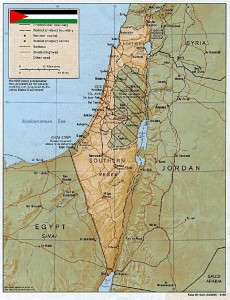“If member state cooperation with UN mechanisms is a voluntary act that can be withdrawn at any time, including from the General Assembly, then the fundamental legal nature of “member state” status would become functionally meaningless; such an approach would greatly undermine the fundamental legal contract into which all states enter when they agree to the treaty obligations required to become a UN member state,” said CIHRS, on Monday 2 July 2012, in an oral intervention before the 20th session of the HRC.
This week, the HRC discussed the human rights situation in the Occupied Palestinian Territories (OPT) and other Arab occupied territories, in the absence of Israel, which on 14 May formally informed the President of the HRC that it wishes to suspend relations with the HRC and the OHCHR. In the official letter, Israel stated that the decision was reached “in light of the ongoing, unrelenting singling out of Israel in the Human Rights Council.” It further accused the OHCHR and the HRC of working to “bash and demonize Israel.”
“Israel’s blatant disrespect for human rights over the past decades remains the main motive behind continuous criticism of it at the HRC,” said Ziad Abdeltawab, CIHRS Deputy Director. “There is no way that this Council could disregard Israel’s systematic illegal occupation, the expansion of its territories through illegal settlements, its continuous blockade over the Gaza strip, targeted killings, arbitrary arrests and detention of Palestinian activists, and impunity for alleged war crimes and crimes against humanity committed in the past.”
Israel had adopted a nearly systematic policy of non-cooperation with UN human rights initiatives related to the deteriorating human rights situation in the OPT, as was pointed out by several reports submitted by a number of UN experts during this session, including the recent OHCHR progress report on the implementation of the recommendations presented by the fact-finding mission mandated to investigate the incident of the humanitarian Flotilla. It is important to mention that Israel has also refused to cooperate with, or implement, the findings of the UN fact finding mission on the war on Gaza.Until today, Israel stands immune to alleged international crimes. The UN Secretary General also presented a report on the implementation of the HRC resolution, adopted last March, on Israeli settlements in OPT. He noted the continuation of the illegal expansion of Israeli settlements in the West Bank, including East Jerusalem, and a considerable increase in the demolition of Palestinian homes and structures, which have led to a sharp increase in the displacement of Palestinians, including 536 children, since the beginning of the year. He further noted a continuation of violence by Israeli settlers against Palestinians, citing 89 incidents from 22 March – 12 June. No steps were taken by Israel to confiscate arms or enforce criminal sanctions in the settlements.
According to local estimates, around 500,000 Israeli settlers now constitute 200 colonies built on territories recognized under international law to be belonging to the Palestinian people. This has resulted in a gradual change in the infrastructure of the land, transforming it into Israeli territory, with services mostly allocated to the settlers, in addition to increasing exploitation of the natural resources in the territory, including confiscating of some of the most fertile lands in the OPTs.
Israel’s settlement policy constitutes a breach to the Fourth Geneva Convention, namely Article 49 (6), which deems illegal that the occupying power transfers parts of its own population into the territory it occupies. This is in addition of flagrantly going against dozens of UN resolutions. Moreover, indiscriminate attacks against the Gaza Strip by Israeli forces continue, as the illegal blockade of Gaza enters its sixth year, resulting in continuous violations to Gazan residents’ basic rights to access of food, water and freedom of movement. During this session, the OHCHR expressed concern over the blockade and warned against Israel’s border incursions and targeted killings.
Additionally, the UN Special Rapporteur on OPTs, which Israel refuses to cooperate with, addressed the situation of Palestinian prisoners in Israeli jails and the continuation of the policy of illegal administrative detention, describing it as a tool used “to imprison innocent persons who are prisoners of conscience, opponents of policy, or organizers of non-violent protests.” Earlier last May, Israeli Prison Forces struck a deal with Palestinian administrative detainees that went on hunger strike to alleviate their cruel detention conditions and to stop the practice of administrative detentions. However, reports by local groups monitoring Israel’s compliance to the deal indicate little compliance by Israeli forces.
CIHRS urges the HRC to call attention to Israel’s continued refusal to cooperate with its mechanisms, not to mention comply with the resolutions adopted by the Council, and recommends that a system of strict consequences be put in place for countries which renege on their international obligations. In this respect, CIHRS believes an advisory opinion should be sought from the International Court of Justice concerning the validity of Israel’s unilateral decision to withdraw from the Council, particularly in relation to the treaty obligations of UN member states, as well as the legal implications such an act has on the membership privileges of a government within the United Nations system. The continuous violations of the Palestinian people’s basic human rights over the course of 60 years should not be overlooked by all UN members.
Share this Post


